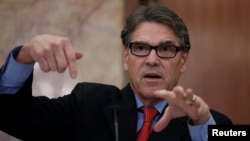The administration of President Donald Trump wants to help allies replicate the U.S. natural gas and oil production boom by exporting American know-how, U.S. Energy Secretary Rick Perry said Tuesday, even as trade disputes intensified.
Perry said the surge in U.S. fossil fuels production over the past several years, made possible by advanced hydraulic fracturing drilling technology, had helped the country to reduce its dependence on foreign oil and improved its economy.
"We are bearing witness to this astonishing energy miracle," Perry said at the opening ceremony of the triennial World Gas Conference. "But this is not just about exporting our energy bounty, it is about exporting the technology, the know-how, that unleashed our bounty in the first place."
He added that he believed replicating the U.S. production boom overseas could help the world's poor to access affordable electricity, and that boosting the share of natural gas in the mix could help limit greenhouse gas emissions.
The Trump administration has repeatedly said it is eager to expand fossil fuel supplies to allies through supply agreements and technology sharing. But the task could become more complicated as it imposes steep tariffs on steel, aluminum and other imports and deals with retaliatory measures against U.S. crops, motorcycles and other products including petroleum.
Beijing this month proposed 25 percent retaliatory tariffs on U.S. petroleum imports, which are expected to dent sales to the U.S. shale industry's largest customer and further pressure American firms that produce gas as a byproduct of oil drilling.
LNG imports have so far been spared, but the industry is concerned that the supercooled gas could be next if China's talks with Washington sour.
That would be particularly bad for the United States, which has become the world's biggest natural gas producer, one of the top crude oil producers, and a growing exporter of both since last year.
The administration has said it hopes exporting energy and related technology will help create alternatives to geopolitical rival energy producers like Russia, while also forging bonds with big consumers like China.
Ambition
The leaders of two of the world's largest energy companies said they were worried trade tensions could destabilize the global economy, hurting overall demand for energy.
"The risk of trade wars starts to weigh on people's perception of economic growth in the future," Chevron Chief Executive Mike Wirth said at the conference. "These things run the risk of becoming a bit of drag on growth."
Darren Woods, ExxonMobil's CEO, said his company is trying to keep a "level-headed voice" around tariffs, but that protectionism can dent investment.
"The world has been very well served with low tariffs and free trade," Woods said. "With tariffs, you run the risk of making some projects less attractive."
The global natural gas industry is currently forecasting rapid growth driven by low-cost production from the U.S. fracking boom and rising demand from Asia. But to capitalize, the gas industry needs to invest billions of dollars in new LNG infrastructure.
The International Energy Agency expects global gas demand to grow an average of 1.6 percent per year over the next five years, with Chinese consumption leading the way, according to the latest forecast released Tuesday.
Challenges
Longer-term, the IEA said the global gas market also faces the challenge of cost competitiveness in emerging markets, and said the industry must tamp down on leaks of methane, one of the most potent greenhouse gases.
Gas is widely viewed as one of the cleanest fossil fuels because it burns more efficiently than oil or coal, but gas can be lost in production and transport.
The conference has drawn executives from global energy giants like Exxon, BP Plc, and Total, along with senior officials from the U.S. State Department's energy bureau, and ministers from energy producers and consumers.
It follows last week's OPEC meetings in Vienna, where the partner countries agreed on a modest increase in oil production from next month, following calls from major consumers to curb rising fuel costs.





